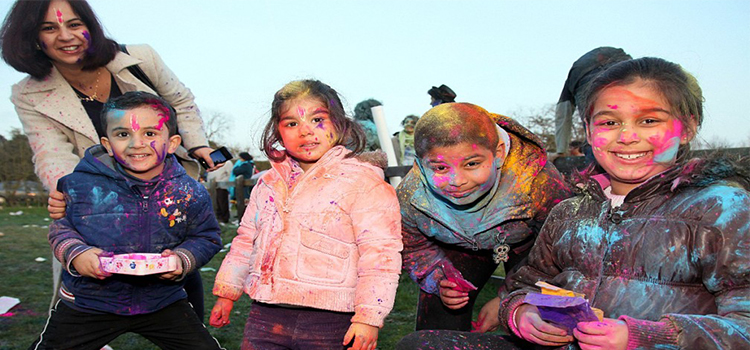At a recent discussion group, attended by UK born Hindus in our 30s, some of whom have young children, a recurring theme was the way in which we would like our children to relate to their Indian cultural and religious heritage.
We inevitably drew on, recounted and considered our own experiences and exposures to Indian culture as children, teenagers and young adults, and the ways in which it shaped us.
Participating in festivals, rituals, celebrations etc are an important aspect of this. In India itself, these aspects of culture are everywhere. They do not take a particular effort for parents to involve their children in them – you just walk out into the street and they’re there!
In Hindu communities outside of India, this is obviously not the case. The first generation of Hindus in countries like the USA, Canada and Britain done well to establish celebrations like Navratri, Diwali, and Raskshabandhan. Some people also have had more in depth exposure to Indian heritage through their parents conscious efforts, such as participating in activities of religious and cultural organisations.
The next generation
We all agreed that we didn’t want to teach children with a view to giving them set answers about the the “great questions of life”. The idea of “set answers” doesn’t resonate well with the two great cultures which we are exposed to – Hindu and Western.
Our own ideas about life and its purpose, and the place of religion and spirituality were still evolving and would continue to evolve for many years to come. We don’t have the answers to many questions, and even the questions to which we do have set ideas and answers; these could never have simply been taught, they were arrived at through a complex mixture of learning, experiences and serious thought on our own part.
We want to put our children in a position to think, question, accept or reject – but there has to be something for them to question, accept and reject in the first place. We had that. Although at the time may of us didn’t think too highly about what our elders – like parents, grandparents and other figures in our community tried to tell us to do (such as follow certain customs and taboos) – we think more highly of their efforts in retrospect when we are put in similar dilemmas to what they must have faced.
Their efforts gave us something to question, an avenue from which to delve further. Celebrations were fun and social. These gave us a sense of belonging to a community. Not that all our experiences of this “sense of community” were entirely positive – there were invariably the same problems associated with any large group of people who like all human beings have their failings – for example bickering, egos, cliquishness etc. But the net effect was on our part positive.
We agreed that when we were growing up, we learnt more from the way people around us were, the examples that they set in their own lives, rather than by what we were told.
We all felt that subliminally and on a deep subconscious level we were imparted a lasting sense of identity through the efforts, imperfect as they were, of our elders – and we’d like to do the same.
But culture is dynamic and ever changing. The efforts of one generation cannot be created exactly the same for the next generation, and nor should this be the case. Times and circumstances have changed. We still have our festivals, but on the other hand many of us do not even speak an Indian language fluently, so certain things like kathas (recitals of sacred / religious tales) of a priest simply are not going to take place, unless through a very strained effort for us to do something that is not natural to us, i.e. our parents may have had kathas because they wanted to; but if its not something we’d personally enjoy it would be strange just to start hosting kathas we couldn’t ourselved understand, hoping it would somehow benefit our kids.
We felt that we needed to do something a little different. One of the ideas that everyone seemed to agree with or think would work, as it in tune with the way we do things, would be to meet up before going to a festival celebration like Navratri or Diwali, and discuss a topic with our friends and kids relevant to the celebration before we go there. This would serve both a social and a thought stimulating function for the young ones there.
We felt we had to make a conscious effort to continue the parts which we appreciated of our experiences. Festivals being a particular point. As the organisers of these festivals become older, and eventually unable to continue their efforts, who will carry them on? It cannot always be somebody else’s responsibility – some of us would have to take on some of these responsibilities – difficult as they would be to balance with life’s other commitments.
Literature
Having a habit of reading, and keeping a healthy selection of books that we had gained something from is also important. Over time, our children would have moments of curiosity that would see them searching for ideas and answers. Giving them ready access to literature that we’d found rewarding is invaluable. Of course, this is only likely to be useful for parents who themselves have read a number of books. It is not advisable to presume the contents of books, as there are a number of dubious and negative books out there on subjects relating to Hinduism and Indian culture, and if we kept books that we had not read ourselves, we may be opening up our children to incorrect first influences. Not that we wish to indoctrinate by censoring the presence of books we don’t like – but the books that we want our children to have access to in their first striving should be ones that we’ve read and appreciated.
Discussion / groups
The need to discuss things in an open minded and non-judgmental fashion with peers or a group is also important – perhaps more important than just having an exposure to literature. The energy of being with others and seeing a range of ideas and experiences of people in a similar position to us creates a shared sense of journey and enthusiasm, rather than toying with ideas in our own minds. We would have to create opportunities of this sort for our children, whether through participating in the efforts of other organisations or starting our own informal gatherings of friends and/or extended family.
Why even bother
Some would ask – why even bother with making an effort to try and transmit Indian culture and a Hindu identity, after all shouldn’t the next generation of ALL communities and cultures just merge? The issues that we have is that in effect this would mean our kids are totally absorbed into a Western way of life. We see the advantages and disadvantages of the West. There is plenty to learn from but also plenty of problems here, and clearly the West does not have the answers to all the problems and challenges of life’s many facets.
In the future we would hope that a time comes when everyone openly considers the points of views of all cultures, religions and philosophies, and that must include the best parts of our own heritage. A certain richness and beauty is imparted into life through cultural experience, which in turn enriches the societies in which we live. Rather than being a source of separation in society, our efforts to continuously recreate, rejuvenate and transmit our cultural heritage will benefit society by giving others first hand exposure to other ways of life to society around us.






























